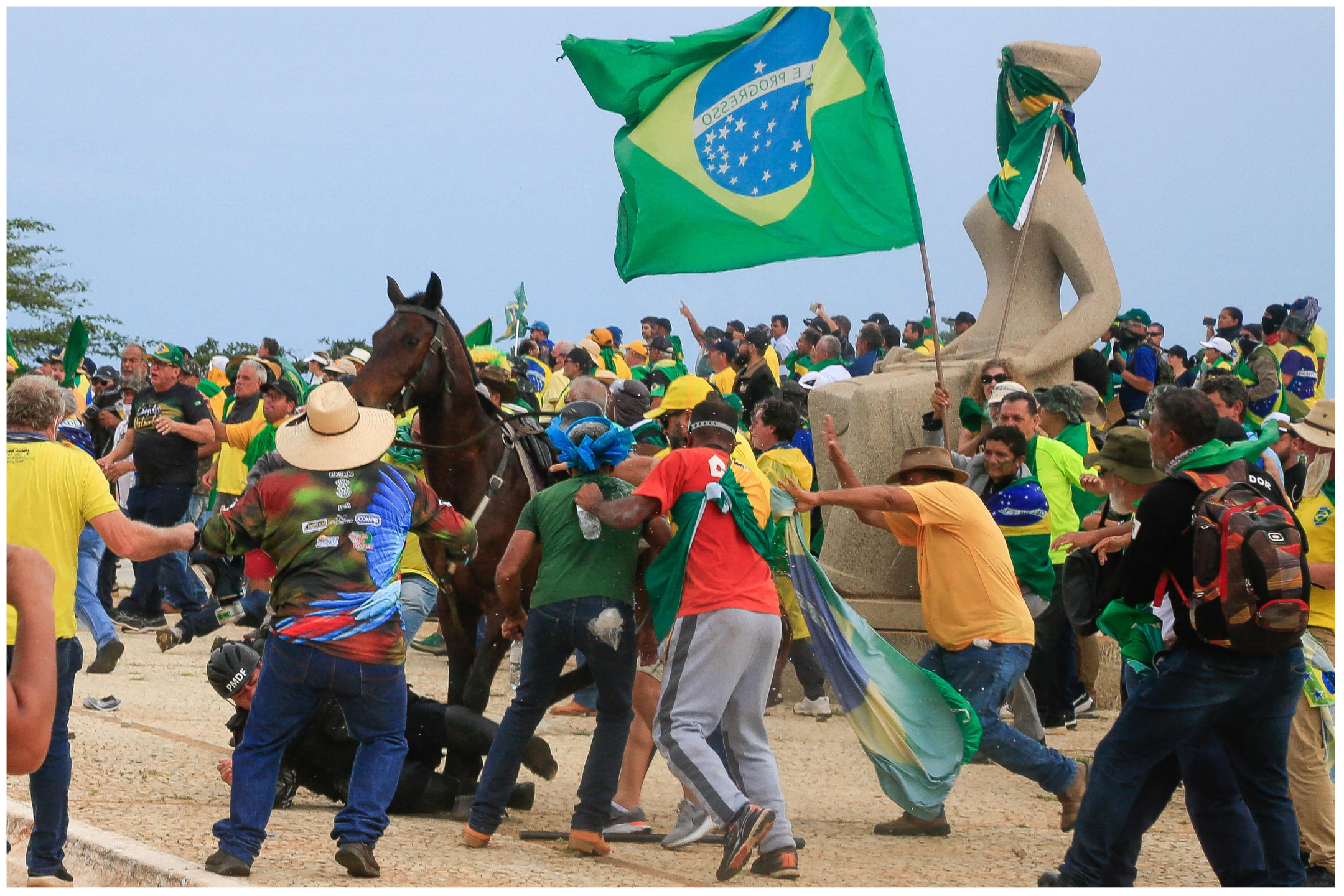How QAnon World Is Reacting to Brazil Protests
QAnon influencers and other conspiracy theorists reacted with glee after supporters of Jair Bolsonaro stormed government buildings in Brazil on Sunday.
In a case with striking similarities to the January 6 U.S. Capitol riots two years ago, hardline backers of far-right former president Bolsonaro ransacked the Brazilian Congress.
Bolsonaro supporters—who also stormed the Brazilian Supreme Court and presidential palace—believe the October run-off election in the country was rigged and that current left-wing President Luiz Inácio Lula da Silva, known mononymously as Lula, is illegitimate.
Unlike the January 6 riots, Bolsonaro supporters did not prevent Lula’s inauguration as he assumed the presidency on January 1. Bolsonaro himself was not present in the capital Brasilia and had instead left the country for Florida where he has been staying since December 30.

Getty
Bolsonaro had previously hinted the election could be met with fraud attempts, but has not shared proof to support his account.
While world leaders and Bolsonaro himself condemned participants, QAnon influencers and other conspiracy theorists voiced their support for the riot.
While the debunked QAnon movement believes in a number of fantastical claims, chiefly of an elite cabal of Satanic, cannibalistic pedophiles operating a global child abuse ring, they have shared mainstream conservative views.
Donald Trump is a key figure in the QAnon mythos and many influencers and followers of the movement believe—like many other conspiracy theorists and a number of Republican voters—that the 2020 election was somehow stolen from him.
Many QAnon influencers also believe elites around the world, who some dub the New World Order (which in itself is an older debunked conspiracy theory), are working to undermine countries around the world.
Far-right leaders such as Bolsonaro and Russian President Vladimir Putin are regularly praised as upholding Christian values and taking on what they view as an increased leftist influence in society.
John Sabal, who has organized QAnon conventions where Republican lawmakers have been in attendance, told his 59,531 Telegram followers: “I said it from the start that the people of Brazil were not going to put up with this stolen election. It’s a proper civilian group against tyranny.”
Ultra Pepe Lives Matter, a QAnon account with some 214,224 followers, shared a video of Bolsonaro supporters in the country’s Congress with the caption: “Prepare for the mainstream media to demonize, yet again, those patriots who won’t stand for rigged elections. But we know the truth.”
TheStomHasArrived17, a QAnon account with 146,602 followers, shared a tweet of Hilary Clinton condemning the riots and added: “You know the election in Brazil was corrupt when Hilary Clinton comes out and says it was a ‘free and fair election.”
Rioters were also praised by other conspiracy theorists, who share a common belief in election fraud.
David Wolfe, a pseudoscience promoter, told his 110,794 Telegram followers: “Breaking: Bolsonaro supporters have broken into the Presidential palace in Brazil. They want their WEF [World Economic Forum] approved Biden-equivalent election cheater (Lula) thrown back in prison and Bolsonaro to be declared the rightful leader of the country.”
Stop the Steal organizer and far-right activist Ali Alexander added: “The National Supreme Court in Brazil is illegitimate and the most corrupt part of the country. They don’t respect the law or the people. Do whatever is necessary. Love y’all.”
Karen Douglas, professor of social psychology at the University of Kent in the U.K. explained there were many reasons why people believe conspiracy theories.
She told Newsweek: “Research suggests that people are attracted to conspiracy theories when one or more psychological needs are frustrated. The first of these needs is epistemic, related to the need to know the truth and have clarity and certainty.
“The other needs are existential, which are related to the need to feel safe and to have some control over things that are happening around us, and social, which are related to the need to maintain our self-esteem and feel positive about the groups that we belong to. People might be attracted to conspiracy theories to try to satisfy these needs.”
The expert pointed out that this “perspective essentially means that anyone can fall prey to conspiracy theories if they have psychological needs that are not being met at any particular time.”
Douglas said: “This is perhaps one explanation why we tend to see a lot of conspiracy theories—including those about vote rigging—around election times. People are worried, mistrustful, and uncertain about the future, and looking for ways to understand what is going on. Indeed, conspiracy theories do seem to thrive in times of social unrest.
“Conspiracy theories have consequences and can affect people’s intentions and behaviors. Conspiracy theories historically have been linked with prejudice, genocide, risky health behavior, climate denial, and more recently some quite disturbing behavior related to QAnon and COVID-19 conspiracy theories. They can turn people away from mainstream politics in favor of more extreme political views.”

